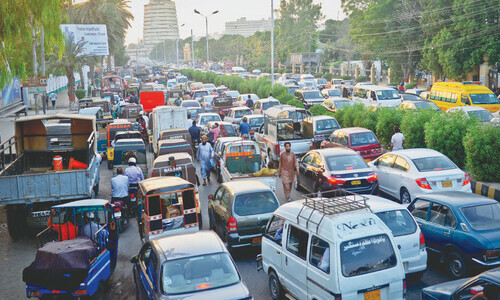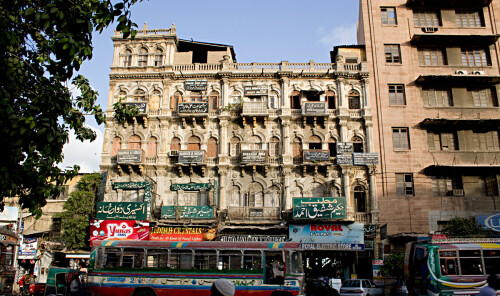
To break out of the cycle of jobless growth and retarded social progress that has left the province trailing behind even the low national social indicators, Sindh needs a big idea.
The budget to be announced later in the day will, besides routine business, spell out what politically suits the PPP government and not necessarily what the province needs for a turnaround.
According to details gathered, the one trillion rupees tax-free Sindh budget 2017-18, to be presented today, would be well structured to neatly fit into parameters laid down under three year rolling guidelines of the ‘Budget Strategy Paper (BSP) 2017-20’.
The budget would have a deficit within the range of Rs13-16 billion. The size of last budget was Rs869bn.
“Comfortably entrenched in the power structure of the province the PPP-led provincial government, in the last year of its second tenure, is expected to follow in the footsteps of the federal government”
The government, according to a member of the provincial economic team, abstained from extending the tax net in the upcoming budget despite several proposals from the revenue department in this regard.
“The Sindh Board of Revenue resource mobilisation has persistently been increasing. It has achieved Rs78bn target set in the last budget and under the same taxation framework the government has pushed up the target to Rs100bn in the upcoming budget”, an officer told Dawn.
The size of the Sindh Annual Development Plan would be Rs250bn in 2017-18 up from Rs225bn in the concluding year; that is about one fourth of the size of the budget.
Total development spending would include Rs30bn dedicated to the uplift of districts, Rs43bn foreign funding and Rs27bn PSDP. “The government is actively considering giving Rs10bn to municipalities”, an official informed.
On the expenditure side, the social sector — education and health — will be given priority and their development budgets will be jacked up. The focus would again be on completion of ongoing schemes.
In the year ending, 526 schemes were completed as the process of the release of funds was streamlined and its utilisation monitored and expedited.
In 2016-17 as much as 92pc, Rs207bn of a development budget of Rs225bn, has been released against 86pc (Rs139bn) in the corresponding period last year. Till May 31, according to finance department officials, Rs135bn have been utilised against Rs78bn spent a year before.
Some senior members of the provincial economic team were all praise for their leader. “Murad Ali Shah is both motivated and capable. The progress made under him over the past year and a half, in my view, is more than what was achieved collectively in eight years of a PPP government in Sindh.
“The working environment in the province is far from congenial. Often various pillars of the government work at counter purpose here”, a senior officer said.
Explaining his point he gave the example of a Sindh High Court decision that resulted in a month-long strike of trucks and trawlers in Karachi and how it impeded the pace of development work.
“For a whole month the work remained suspended at many sites across Karachi as the required machinery and raw materials could not be shipped because of the strike”, one bureaucrat said.
A leading voice of the farming community was not convinced. “If you gauge the success of a government by the starting office time or number of meetings in a day, then yes, Murad Ali Shah has surpassed others. Could this be enough? The real test is the status of economy and the quality of life of the people.
“I can’t speak for the manufacturing and services sector but in this day and age fate decides the outcome in agriculture. The agri ministry and related departments are in a mess. The change looks distant because energy is being directed to save the staus quo”, he said.
“The industry is in stress. The service sector, however, is thriving. Be it retail, real estate, advertising, banking, teaching or health care, a good business model pays off. No, I still do not support the PPP government because the leadership is both corrupt and irresponsible. It is a deadly combination and can prove to be very hurtful”, a businessman said.
“What data? Let leaders spend a week in Orangi Town. Life is very tough. Routine economic stress, prolonged power failures, low gas supply, water scarcity and commuting to the city for work drives people crazy. The PPP failed miserably in delivering on its promises”, Inaam, a resident of Orangi town who works in a boot store in Saddar commented.
The Budget Strategy Paper, approved by the Sindh cabinet last month, highlights mobilisation of its own resources to reduce dependence and identifies improvement in governance standards by implementing the World Bank sponsored ‘Public sector management reform project’ as an objective. The said project aims to enhance transparency in budget formulation, allocation and execution.
According to officials, the focus of the development budget would again be on an early completion of as many ongoing schemes as possible, and only new schemes that can be finished within a year would be included in budget proposals.
When approached, the finance department shared some basic facts. During the closing financial year 2016-17, the total revised revenue was Rs710.4bn which includes Rs550.4bn federal transfers, Rs470bn revenue assignments, Rs54.9bn straight transfers, Rs12.2bn development grants (PSDP and foreign), Rs133bn octroi zila tax (OZT).
The own revenue had been revised at Rs160bn which includes sales tax on services: Rs78bn, other tax receipts: Rs70bn and non-tax revenue: Rs12bn.
“Enjoying critical public support and comfortably entrenched in the power structure of the province the PPP-led provincial government in the last year of its second tenure is expected to follow in the footsteps of the federal government”, commented a Sindh watcher.
Published in Dawn, The Business and Finance Weekly, June 5th, 2017












































